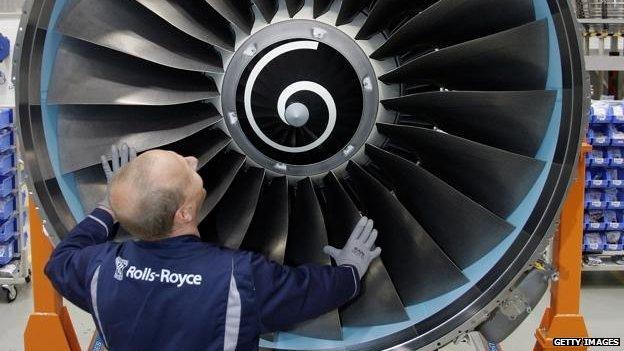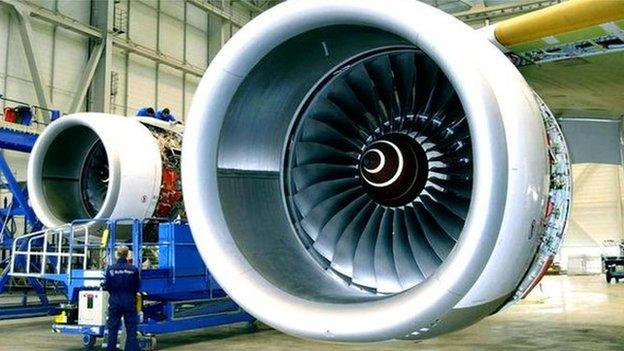Rolls-Royce to cut 2,600 jobs
- Published

Engineering group Rolls-Royce has said it is planning to cut 2,600 jobs over the next 18 months.
It said, external most of the jobs would go in its aerospace division, with most of the posts being shed in 2015.
It is not clear where the cuts will be made from Rolls-Royce's global workforce of 55,000, 24,000 of whom are in the UK.
However, the Unite union told the BBC there would be 800-1200 engineering jobs cut in Derby and Bristol.
Rolls-Royce also said Finance Director Mark Morris leaves after 27 years with the firm and would be replaced by David Smith, who is promoted from finance director of the Aerospace division.
The company's chief executive John Rishton said: "The measures announced today will not be the last, however they will contribute towards Rolls-Royce becoming a stronger and more profitable company."
Last month, Rolls warned that its underlying revenues for 2014 would be 3.5-to-4% lower than expected.
Unite's national officer Ian Waddell said: "Rolls-Royce is in danger of making decisions in the short term that it will later regret. This is a bitter blow to a proud workforce and we will be doing everything we can to fight for jobs and skills."
The company said voluntary redundancy would be offered, although it could not rule out compulsory redundancies.

Analysis: Kamal Ahmed, BBC business editor
Today's announcement on job losses is likely to be the start of a series on cutting costs for Rolls Royce. After a profits warning in February and October, the company is under pressure to act.
Aviation - where these job losses are - has not been as affected by the economic downturn and Russian sanctions as Rolls Royce's land and sea businesses, and those divisions will now be under scrutiny.
Company sources say that the aviation losses are more closely linked to a general cut in global defence spending, greater productivity after investment in new factories and an end of the development phase of the new Airbus A350 and Dreamliner engines.
Those with good knowledge of the company have told me that the 2,600 job losses will be split between civil and defence aviation in the UK and the US, with two-thirds of the losses coming in the UK.
The business hopes that all the losses will be voluntary and the process will be largely completed this year and into the first half of 2015.

Widespread
The company's UK staff are employed at four locations in the East Midlands, as well as 1,500 at five sites in the North West and 2,400 employees at six locations across Scotland.
A Scottish Enterprise spokeswoman said: "We have been in contact with Rolls-Royce, and at this stage there is no impact on the Scottish operations."
The two largest sites are in Bristol and Derby.
The company said it had become more efficient, and cited the fact a large engineering team, needed for the development phase of two Trent engines, were no longer needed as both these were now in production.
That would point to job losses in Derby, where the Trent engines, used by many international airlines, are built.
Rolls-Royce is the second largest aero-engine maker in the world.
It has customers in more than 120 countries, including more than 380 airlines and leasing firms, 160 armed forces, 4,000 marine customers including 70 navies, and 1,600 energy and nuclear customers.
Rolls-Royce said the job losses would cost it £120m over the next two years, but would bring "annual cost benefits" of £80m once implemented.
A statement from the Department for Business said: "We have consistently supported Rolls-Royce in the UK and will continue to work with them and local partners to support those affected - for example the Talent Retention Solution matches engineering talent with new job opportunities."
- Published17 October 2014
